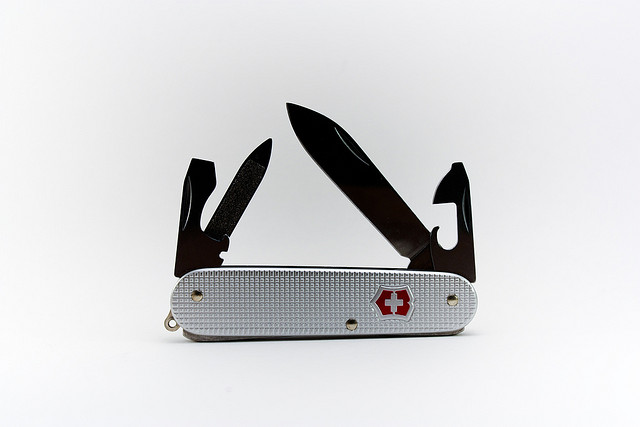Zero-tolerance policy abuse cuts like a knife – and slashes young lives
As student behavior in our schools went from bad to worse, somebody tossed out the term "zero tolerance." School administrators struggling to stay afloat in troubled waters embraced the idea with the enthusiasm of shipwreck survivors scrambling onto a life raft. Michigan legislators quickly climbed aboard.
Zero tolerance wouldn't just spare school officials the burden of having to make tough calls, it would actually forbid such discretion. It would ban them from using their judgement to navigate the murky depths of juvenile discipline.
Intent? Mitigating circumstances? The history of the accused? None of it would matter. Relieved of their rightful role as educators and adults to assign punishment appropriate to the crime, administrators sailing under the flag of zero tolerance could say, "We're sorry, but we had no choice in the matter; it's out of hands."
Zero tolerance equals zero judgment equals zero responsibility.
Take the recent case of Atiya Haynes, a senior at Annapolis High School in Dearborn Heights. Last month school officials who thought Haynes was smoking marijuana in the girls' room searched the purse of the 17-year-old honor student. They didn't find any pot, but did find a small pocketknife her grandfather had given her. It had a 3 1/4-inch blade.
As it turned out, Haynes wasn't smoking pot; nonetheless, the knife in her purse got her suspended for the rest of her senior year because of the district's policy toward possessions of "weapons" on school property. Now, keep in mind that Haynes never removed the so-called "weapon" from her purse and, in fact, never touched it. She begged school officials to let her finish the rest of her senior year. In a letter to the school board, she wrote:
"I did not have bad intentions; I’m a dedicated student, in advanced placement courses, dual-enrolled, I work two jobs and have aspirations beyond oratory expression. I just don’t want my efforts thus far to be cut short or even be terminal for such an incident like this. I understand the seriousness of the situation, but I just don’t want it to be my ultimate determining factor."
Nonetheless the board upheld the suspension. Haynes was allowed, however, to take online classes and will graduate with her classmates next year.
As a columnist for the Lansing State Journal, I wrote about Jeremy Hix, a 17-year-old Holt High School student. Honoring his Scottish heritage, Hix dressed for his senior prom in authentic bagpiper's regalia, which included a skandubh, a knife with a 3-inch blade.
Consistent with Scottish tradition, Hix carried the knife in a sheath tucked into his sock. He never took the knife from its sheath, but a chaperone at the prom spotted it and reported HIx for possessing a weapon.
Hix faced expulsion. His family hired a lawyer who managed to talk the school board down to a semester-long suspension.
The madness began reasonably enough with the federal Gun-Free Schools Act of 1994, which mandates that students who bring guns to school be expelled for at least a year. Michigan upped the ante with legislation in 1995 that insists on permanent expulsion for students who bring "dangerous weapons" to school.
So what's a dangerous weapon? It could be the scissors in a teacher's desk drawer, or the glass vase on the school secretary's desk, or the bats in the baseball team's equipment locker. Was there potential danger in Haynes' pocket knife and Hix's skandubh? Theoretically, yes. But clearly the two students in question had no intention of doing any harm.
They are by no mean the most blatant cases of zero-tolerance insanity. In a story earlier this year a Bridge reporter wrote, among other cases, about a Michigan eighth-grader suspended for 180 days because he had an Airsoft gun, which shoots plastic pellets, and a Detroit high school sophomore suspended for carrying an eyebrow-shaping tool that contained a razor-like blade.
Responding to questions about the Atiya Haynes case, Todd Thieken, superintendent of Dearborn Heights District 7 Schools, told reporters that those who found fault with Haynes' suspension should blame the state Legislature. But it seems to me that the true blame lies elsewhere – with those who are unable, or unwilling, to draw a distinction between a pocket knife in a purse and a dangerous weapon.
See what new members are saying about why they donated to Bridge Michigan:
- “In order for this information to be accurate and unbiased it must be underwritten by its readers, not by special interests.” - Larry S.
- “Not many other media sources report on the topics Bridge does.” - Susan B.
- “Your journalism is outstanding and rare these days.” - Mark S.
If you want to ensure the future of nonpartisan, nonprofit Michigan journalism, please become a member today. You, too, will be asked why you donated and maybe we'll feature your quote next time!


 Sure, it can draw blood, but it can also get lost in the bottom of a purse or backpack. And does anyone think this is a serious threat to school safety? (Photo by Flickr user Basheer Tome; used under Creative Commons license)
Sure, it can draw blood, but it can also get lost in the bottom of a purse or backpack. And does anyone think this is a serious threat to school safety? (Photo by Flickr user Basheer Tome; used under Creative Commons license)